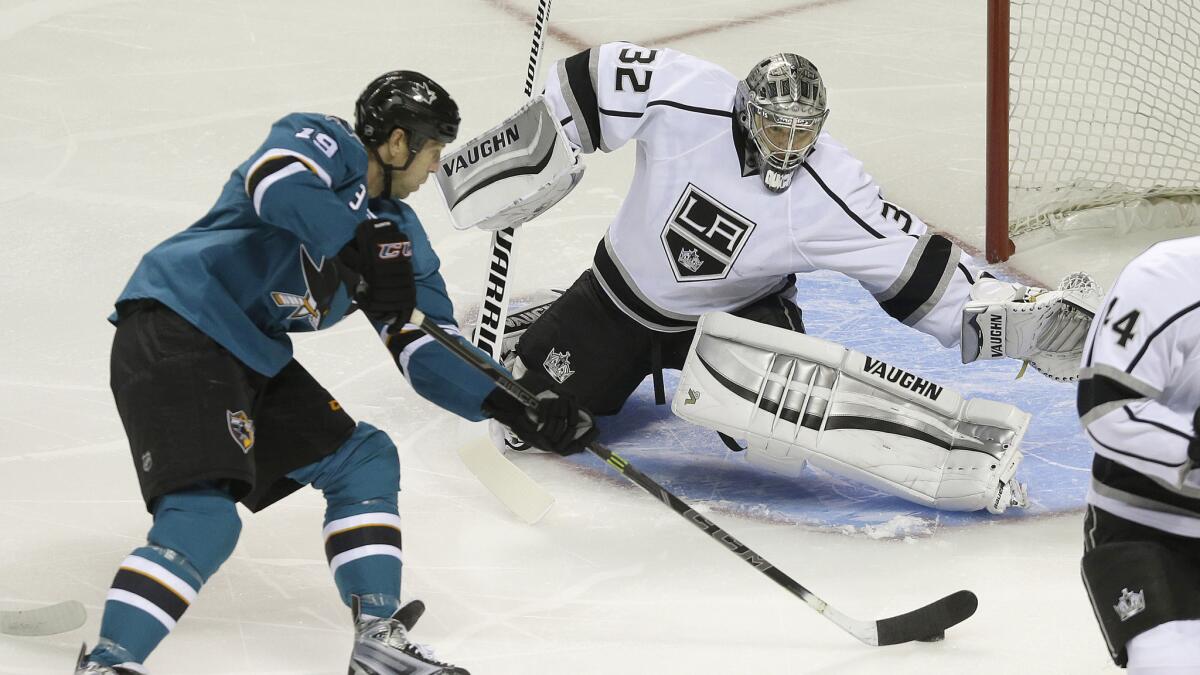Everything’s cool as NHL season opens

- Share via
No lockout to shorten the season. No Olympics to condense the schedule. No major rule changes or alterations to a playoff format that introduced wild-card races last season.
With the NHL enjoying prosperity on many fronts, the 2014-15 season will begin Wednesday amid a rare sense of stability.
Opening night of the league’s 98th season will feature the Kings raising their Stanley Cup championship banner at Staples Center before facing the San Jose Sharks, scheduling that can be taken as wickedly funny or diabolically cruel.
The Sharks, in the most epic of their postseason failures, squandered a 3-0 series lead over the Kings in the first round of the playoffs, launching the Kings on a dramatic run to their second title in three seasons.
The NHL has bounced back impressively from the 2012-13 lockout. League revenues last season hit about $3.7 billion and the salary cap this season was set at a new high, $69 million. There are — and always will be — a few ownership issues. Should scoring be higher? Blame well-trained goaltenders. And though Canada’s Stanley Cup famine continues — the 1993 Montreal Canadiens were the last Canada-based team to bring the Cup “home” — its sons remain the NHL’s lifeblood.
The NHL is enjoying a boom, boosted by the advance of teams from Chicago, Boston, New York and Los Angeles to the Stanley Cup Final the past few seasons. For the moment, league executives seem content to leave well enough alone, though expansion seems inevitable within the next five years. The NHL also learned less is more, preserving the special-event feel of outdoor games by cutting their number from six last season to two.
“The league is coming off what many consider and have characterized as its best season ever, both on the ice and off,” Deputy Commissioner Bill Daly said. “We are in a good place right now. But the really exciting part is that we all believe it can get even better. The game is growing, and it will continue to grow. Hockey has never been more visible, more popular and more relevant, particularly in this country.”
The playoff format adopted last season will be the same. The top three teams in each of the four divisions will qualify; the two teams with the next-best records in each conference will get wild-card berths. Last season, Columbus and Detroit earned wild-card spots in their first season in the East. In the West, both wild-card teams came from the Central division, Minnesota and Dallas.
The newest rule changes are mostly procedural, such as having teams switch ends before the start of regular-season overtime and performing a “dry scrape” of the ice. Unfortunately, the “Spin-o-Rama” was banned in penalty shot situations or the shootout, robbing players of a chance to be creative.
“I would characterize all of the rule changes to be more along the lines of tweaks as opposed to fundamental changes,” Daly said.
The goaltender’s restricted area behind the net was expanded by two feet on each side, giving goalies more room to help defensemen who come back for the puck. That also could allow forecheckers to steal the puck from goalies who aren’t as clever at puck handling as they think they are — and there are many.
The use of video review was expanded to give NHL hockey operations executives more discretion to help referees determine if a goal is a “good hockey goal.” The hockey operations staff can provide guidance to the referees in situations where referees blew the whistle or intended to blow the whistle after losing sight of the puck. That has always been contentious; hockey operations now can discuss the timing of the puck entering the net and the referee’s use (or intent to use) the whistle. Hockey operations also will require stronger video evidence of a distinct kicking motion to overrule a goal call or uphold a no-goal call.
Tripping will be called when a defending player dives and trips an attacking player even if the defender makes initial contact with the puck. Also, a scale of punishment for diving/embellishment was established for players and coaches, beginning with a warning to the player on the first offense and rising to a $5,000 fine. Coaches will be fined $2,000 with the fourth incident.
Only minor changes, all that the league needed. It will be fun to have a “normal” season again, or as normal as things get in the NHL.
More to Read
Go beyond the scoreboard
Get the latest on L.A.'s teams in the daily Sports Report newsletter.
You may occasionally receive promotional content from the Los Angeles Times.






